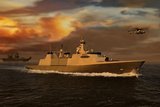The first ship in the second batch of five Braunschweig-class (K130) corvettes for the German Navy was officially named Köln in a 21 April ceremony at the Blohm+Voss shipyard in Hamburg.
Köln was laid down in April 2019. Pending the arrival of the final sternship and foredeck sections and completion of the final equipment phase, the 89m-long vessel will ‘undergo all necessary functional tests and acceptances in coordination with the specialist departments of the contracting authority and the German Navy’, Blohm+Voss noted in a statement.
Five new K130 vessels (ships six to ten in the Braunschweig
class) are being built under a September 2017 contract at multiple German shipyards by an industry team led by NVL Group (formerly Lürssen Defence).
The seventh and eighth Braunschweig-class corvette (the future Emden and Karlsruhe) are at different phases in the final equipment phase, and the future Augsburg
is in production.
The tenth (as-yet-unnamed) K130 vessel was laid down in early 2022.
According to Shephard Defence Insight, all five ships will be delivered to the German Navy by 2025. Each of the second batch of vessels costs about $500 million, displaces 1,800t and can reach a top speed of 26kt.
K130 Corvettes Batch 2 (6-10) [Germany]
Braunschweig Class (K130)






















